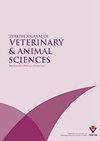应用聚合酶链反应检测伊朗骆驼流产病例中的伊文氏锥虫
IF 0.6
4区 农林科学
Q4 VETERINARY SCIENCES
引用次数: 3
摘要
伊文氏锥虫是一种血液寄生虫原生动物,可在牛和骆驼等多种经济价值动物中引起锥虫病或生存。这种感染导致骆驼流产。本研究采用聚合酶链式反应PCR方法对伊朗骆驼流产胎儿中伊文氏锥虫的存在进行了检测。在本研究中,从伊朗东部的一个伊朗骆驼群收集了244例流产胎儿的皱胃内容物。结果显示,244例流产胎儿中有41例(16.8%)感染伊氏锥虫DNA。结果表明,伊朗骆驼群中流产的高比例是由伊瓦氏锥虫感染引起的。流产胎儿伊万氏锥虫DNA阳性在不同取样地点差异有统计学意义(P < 0.05)。本文章由计算机程序翻译,如有差异,请以英文原文为准。
Detection of Trypanosoma evansi in camel abortions (Camelus dromedarius) in Iran using polymerase chain reaction
Trypanosoma evansi is a blood parasite protozoan that causes trypanosomiasis or surra in a variety of economically valued animals such as cattle and camels. This infection causes abortion in camels. The present study was conducted to evaluate the presence of Trypanosoma evansi in aborted fetuses of Iranian camels Camelus dromedarius by polymerase chain reaction PCR method. In this study, 244 abomasal contents of aborted fetuses were collected from an Iranian camel herd in the east of Iran. The results showed that 41 of 244 16.8% aborted fetuses were infected with Trypanosoma evansi DNA. The results showed that a high percentage of abortions in Iranian camel herds were due to Trypanosoma evansi infection. There was a significant difference in positive Trypanosoma evansi DNA in aborted fetuses between sampling locations P < 0.05 .
求助全文
通过发布文献求助,成功后即可免费获取论文全文。
去求助
来源期刊
CiteScore
1.30
自引率
0.00%
发文量
57
审稿时长
24 months
期刊介绍:
The Turkish Journal of Veterinary and Animal Sciences is published electronically 6 times a year by the Scientific and Technological Research Council of Turkey (TÜBİTAK).
Accepts English-language manuscripts on all aspects of veterinary medicine and animal sciences.
Contribution is open to researchers of all nationalities.
Original research articles, review articles, short communications, case reports, and letters to the editor are welcome.
Manuscripts related to economically important large and small farm animals, poultry, equine species, aquatic species, and bees, as well as companion animals such as dogs, cats, and cage birds, are particularly welcome.
Contributions related to laboratory animals are only accepted for publication with the understanding that the subject is crucial for veterinary medicine and animal science.
Manuscripts written on the subjects of basic sciences and clinical sciences related to veterinary medicine, nutrition, and nutritional diseases, as well as the breeding and husbandry of the above-mentioned animals and the hygiene and technology of food of animal origin, have priority for publication in the journal.
A manuscript suggesting that animals have been subjected to adverse, stressful, or harsh conditions or treatment will not be processed for publication unless it has been approved by an institutional animal care committee or the equivalent thereof.
The editor and the peer reviewers reserve the right to reject papers on ethical grounds when, in their opinion, the severity of experimental procedures to which animals are subjected is not justified by the scientific value or originality of the information being sought by the author(s).

 求助内容:
求助内容: 应助结果提醒方式:
应助结果提醒方式:


